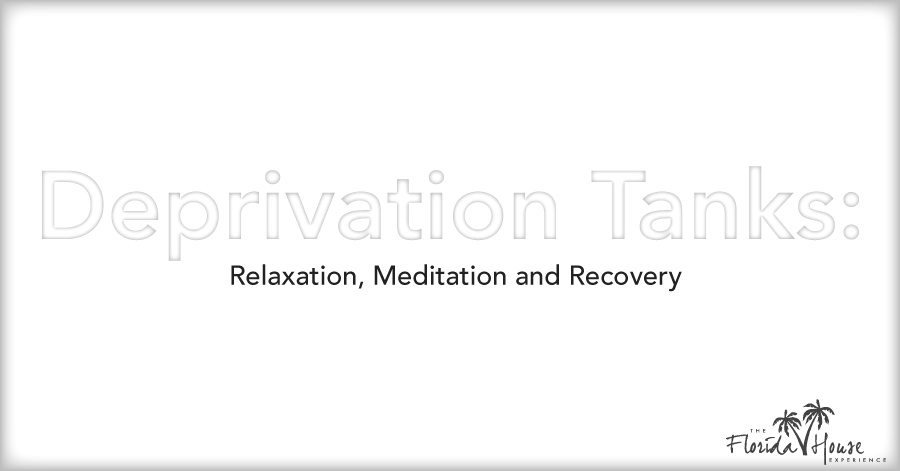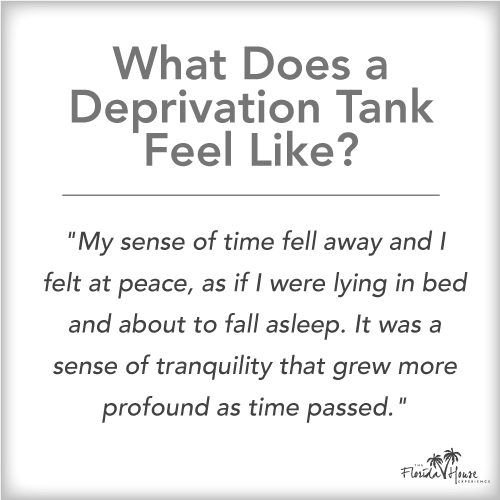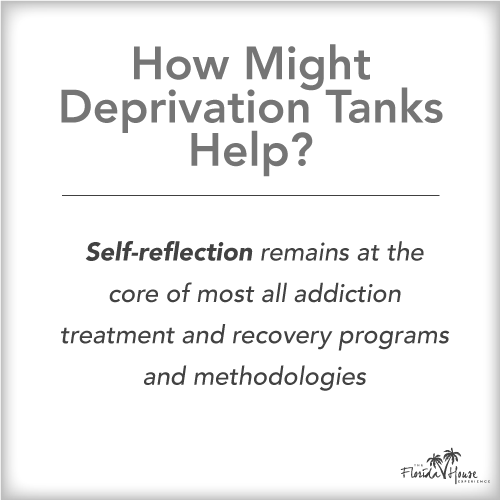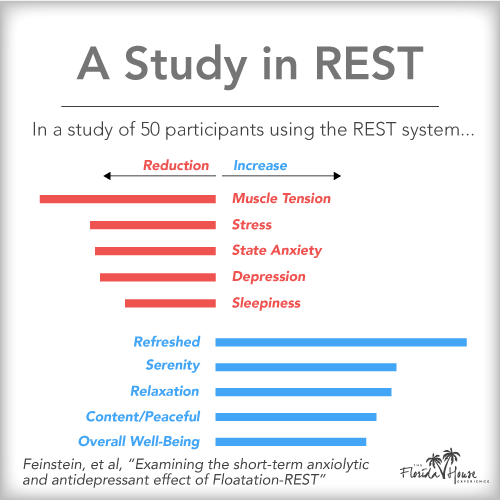
What Is A Deprivation Tank?
Imagine entering into a small, enclosed structure that’s filled with just enough salt water to allow you to float freely, without touching the bottom or sides. Wearing nothing but a pair of earplugs and your birthday suit, you lie down, pull the door closed, and turn off all the lights and speakers inside the enclosure. You’re now in complete darkness, and the only noises you hear are the sounds of your heart beating and the light movement of your body in the water.
Also known as a flotation tank, isolation tank, or Restricted Environmental Stimulation Therapy (REST) tank, behavioral scientist Dr. John C. Lilly is credited with the development of the first modern deprivation tank in 1954.
When they were first introduced, the water inside deprivation tanks contained approximately three percent salt – about the same level of salt found in seawater. When commercial float tanks were launched in 1972 by Glenn Perry the salt level was raised to the current standard ten percent in order to ensure maximum flotation – and virtually eliminate any risk of drowning while using the tank.
While the design of the structure varies, all types of float tanks have similar features. They are designed to be large enough to allow users to remain suspended in the salt water solution with their legs and arms fully outstretched if they choose. Once the lid is closed, the deprivation tank is designed to completely block all outside light and sound once the lid is closed.
What Does Floating Inside a Deprivation Tank Feel Like?
 Dr. Nathanial Morris, a psychiatrist based in San Francisco, decided to give deprivation therapy a try after hearing reports of success from some of his patients. Given the fact that isolation and sensory deprivation are usually associated with negative experiences such as solitary confinement, he was “intrigued to hear that some patients were using sensory deprivation as a way to heal.”
Dr. Nathanial Morris, a psychiatrist based in San Francisco, decided to give deprivation therapy a try after hearing reports of success from some of his patients. Given the fact that isolation and sensory deprivation are usually associated with negative experiences such as solitary confinement, he was “intrigued to hear that some patients were using sensory deprivation as a way to heal.”
Morris states that during his float session “My sense of time fell away and I felt at peace, as if I were lying in bed and about to fall asleep. It was a sense of tranquility that grew more profound as time passed.”
Float tank users are in control of when the tank lid gets closed (the lid can’t be locked from the outside), and most deprivation tanks offer users the option to leave the lid open. Although leaving the lid ajar degrades the actual deprivation experience, it can reduce fears related to being in a small, enclosed space. And not only does all that salt help to give you a weightless sensation while in the deprivation tank, but it also minimizes the risk of drowning.
Commercial float facilities also recommend that ‘floaters’ wear earplugs during their session to prevent the salty water from getting into their ears. Modern deprivation tanks are usually equipped with internal controls that let users turn the lights inside the tank on and off, and there’s also often a sound system in the unit that gives users the option of listening to relaxing music during their session.
Unsurprisingly, spending time inside a deprivation tank isn’t for everyone. Michelle da Silva of The Georgia Straight, states “I tried sensory deprivation therapy in a float room, and it wasn’t for me.” She reports experiencing more discomfort that relaxation during her one-hour session, which included pain from the salt water contacting a few minor cuts on her body and accidentally getting the float solution in her eyes. da Silva also felt a bit dizzy and mildly nauseated on leaving the tank – an experience that isn’t terribly uncommon for first-time tank users.
Can Floating Inside a Sensory Deprivation Tank Promote Self-Reflection?
 Deprivation tanks were once regarded as being radical, but floating has recently become widely embraced throughout North America, where you can find multiple commercial float tank facilities in most major urban centers. The popularity of deprivation tanks has been boosted by the recent surge in celebrities who float, including Elle MacPherson, Susan Sarandon and Joe Rogan.
Deprivation tanks were once regarded as being radical, but floating has recently become widely embraced throughout North America, where you can find multiple commercial float tank facilities in most major urban centers. The popularity of deprivation tanks has been boosted by the recent surge in celebrities who float, including Elle MacPherson, Susan Sarandon and Joe Rogan.
Pro athletes like Olympic gold medalist Carl Lewis and NBA star Steph Curry regularly use time in a float tank to achieve both physical and mental rejuvenation. Curry states that in addition to the muscle-soothing benefits of soaking in Epsom salts, there’s “also, the sensory-deprivation aspect of it. It’s one of the only places where you can really get unplugged from all the noise and distractions that go on with daily life.”
No matter what your beliefs are, self-reflection remains at the core of most all addiction treatment and recovery programs and methodologies. All types of addiction involve a complex combination of factors that can only be addressed once they are acknowledged by the addict through self-reflection.
The challenge is that when you break down addiction, there’s always something that the addict is trying to escape – a painful memory, a traumatic event, or a lifetime of experiences. Acknowledging what the addicted person is seeking to avoid through substance abuse often requires a great deal of time and effort to even reach a state where these issues can be tough – that’s where a deprivation tank can come in.
Using Deprivation Tanks in Recovery
 According to a review of Albert Goldman’s biography “The Lives of John Lennon” by People Weekly, in 1979 the Beetles frontman had been addicted to heroin and other drugs for over a decade, and he was determined to get clean.
According to a review of Albert Goldman’s biography “The Lives of John Lennon” by People Weekly, in 1979 the Beetles frontman had been addicted to heroin and other drugs for over a decade, and he was determined to get clean.
Lennon had a sensory deprivation tank installed in the attic of his Long Island home, and “to keep himself from relapsing…Lennon would climb inside this big cedarwood box, resembling a coffin, and close the lid” for up to 30 minutes at a time, during which “he experienced a sensation that reminded him of getting high.” It’s reported that Lennon remained clean up until his assassination on December 8, 1980, and that he credited his success in part to his use of a deprivation tank.
Although there is a lack of scientific studies around the use of deprivation tanks in treatment, it’s clear that float therapy may be effective in helping some users achieve the meditative state needed to deal with their addiction. The lack of outside stimulation creates the ideal environment for self-reflection, and floaters usually experience a reduction in their blood pressure, heart rate, and cortisol levels – all things that when elevated can make meditating difficult.






